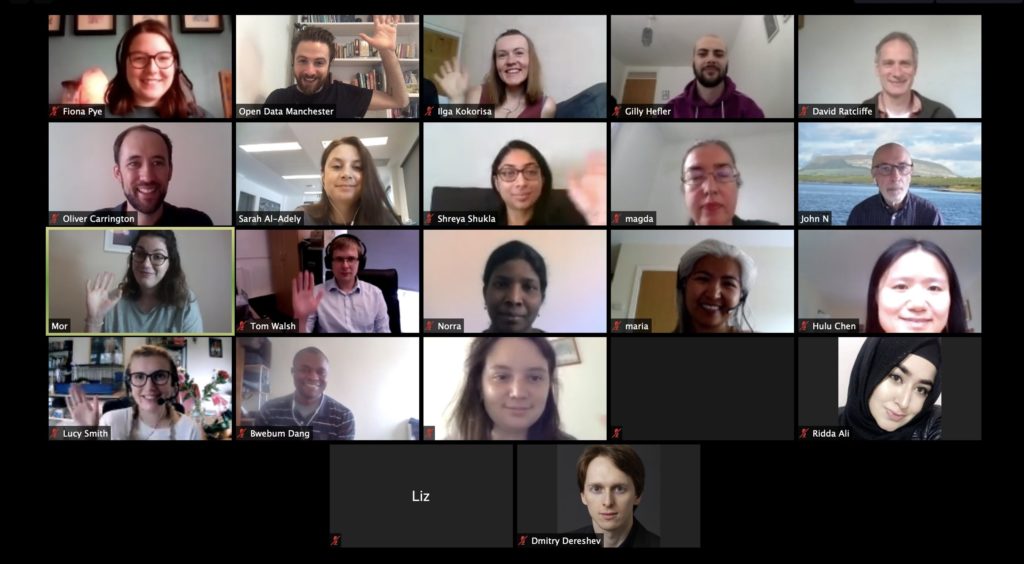My first Data Expedition: a workshop without a Post-it note in sight!
In August 2020, 360Giving and Open Data Manchester co-hosted a Data Expedition for a group of budding data enthusiasts. Through five online workshops, the group worked with data from ‘start to finish’: identifying a question, finding and using data to answer it and finally telling a story with it. Here, Oliver Carrington from Imperial Health Charity, shares how his group used open data to explore the impact of COVID-19 on the hospitals supported by his grantmaking charity.
 I’m the Impact and Evaluation Manager at Imperial Health Charity, an NHS Charity which supports the staff and patients at five London hospitals. I help the grants, arts and volunteering teams at the charity to evaluate their programmes. I’ve previously worked at The Prince’s Trust, New Philanthropy Capital and the Masonic Charitable Foundation. In 2018, my partner and I created a website called Funding Trends, to compare funder data. It won third prize in 360Giving’s Data Visualisation Challenge. I still have a lot to learn about the world of data, so this summer I signed up to be part of the online Data Expedition.
I’m the Impact and Evaluation Manager at Imperial Health Charity, an NHS Charity which supports the staff and patients at five London hospitals. I help the grants, arts and volunteering teams at the charity to evaluate their programmes. I’ve previously worked at The Prince’s Trust, New Philanthropy Capital and the Masonic Charitable Foundation. In 2018, my partner and I created a website called Funding Trends, to compare funder data. It won third prize in 360Giving’s Data Visualisation Challenge. I still have a lot to learn about the world of data, so this summer I signed up to be part of the online Data Expedition.
Over the past few years, I’ve been blown away by the number of grantmakers publishing their grants data using the 360Giving Data Standard. But it is still rare to see the grantmaking sector use data to improve processes and guide strategy, so it was extremely refreshing to be part of the Expedition and find new ways to use data in my own work.
Working collaboratively online
For me, it was a workshop like no other – coming together with people from across the country while at the comfort of my kitchen table. On my screen there were the smiling faces of data scientists, PhD students and other people from the grantmaking world. Sure, there were drawbacks to not being in the same room, but it was great to have the convenience of participating from home and collaborating with others in real-time, using tools such as Slack and Google docs.

We were divided into teams of about six people and tasked with coming up with a question that would be answered using data. Along the way, the experts at 360Giving and Open Data Manchester were on hand to signpost us to open data sources. They helped us figure out how to approach our questions and gave ideas to help tell our stories. There was also much to learn from other attendees. My favourite part was the quickfire, skill-sharing session where I learned about Python in return for my tips on data visualisation.
Investigating COVID-19 health data
Surprisingly, settling on a data-based question was the most difficult part. Too narrow, and we limit what we set out to discover. Too broad, and we lose focus and risk falling into what the facilitators called ‘rabbit holes’ – never ending tunnels that fail to arrive at a final answer. The subject didn’t have to be a social issue, and other teams covered topics as diverse as UK crime rates and Roman roads.
Since our team had a strong interest in health, we couldn’t avoid turning our attention to COVID-19. The group were gracious in agreeing to focus our question on how COVID-19 has affected the hospitals that Imperial Health Charity supports. Each of us used open data from NHS England to explore a sub-question under this theme, including:
- How many COVID-19 deaths occurred at this NHS Trust?
- When did the peak occur?
- What age are COVID-19 patients?
- How many staff were on sick leave due to COVID-19?
- How do these aspects compare with other NHS Trusts?
We discovered that the hospitals supported by Imperial Health Charity ranked 12 out of 220 NHS Trusts in terms of highest COVID-19 deaths, cared for 8% of London’s COVID-19 hospital admissions, and had 89,000 staff sick days caused by COVID-19. In April, when the hospitals most needed its workforce, 1 in 10 staff were off sick.
We have since used these statistics as part of our regular pandemic monitoring and to shape part of our upcoming public report on COVID-19. The report will provide the rationale for mobilising hundreds of volunteers and providing grants to support patient and staff wellbeing.
Grantmakers, get involved
I’d highly recommend grantmaking and charity staff to join future Expeditions, regardless of previous experience. You can learn skills, get to play with data and gain new perspectives through meeting other data enthusiasts. It’s also a perfect opportunity to force yourself to set aside some time to tackle that burning question, or make use of the data you published with 360Giving.
Follow Oliver on Twitter: @olliecarrington, @ImperialCharity.
